Yves here. Thomas Neuburger continues his series on how the CIA evolved into its current form.
By Thomas Neuburger. Originally published at God’s Spies
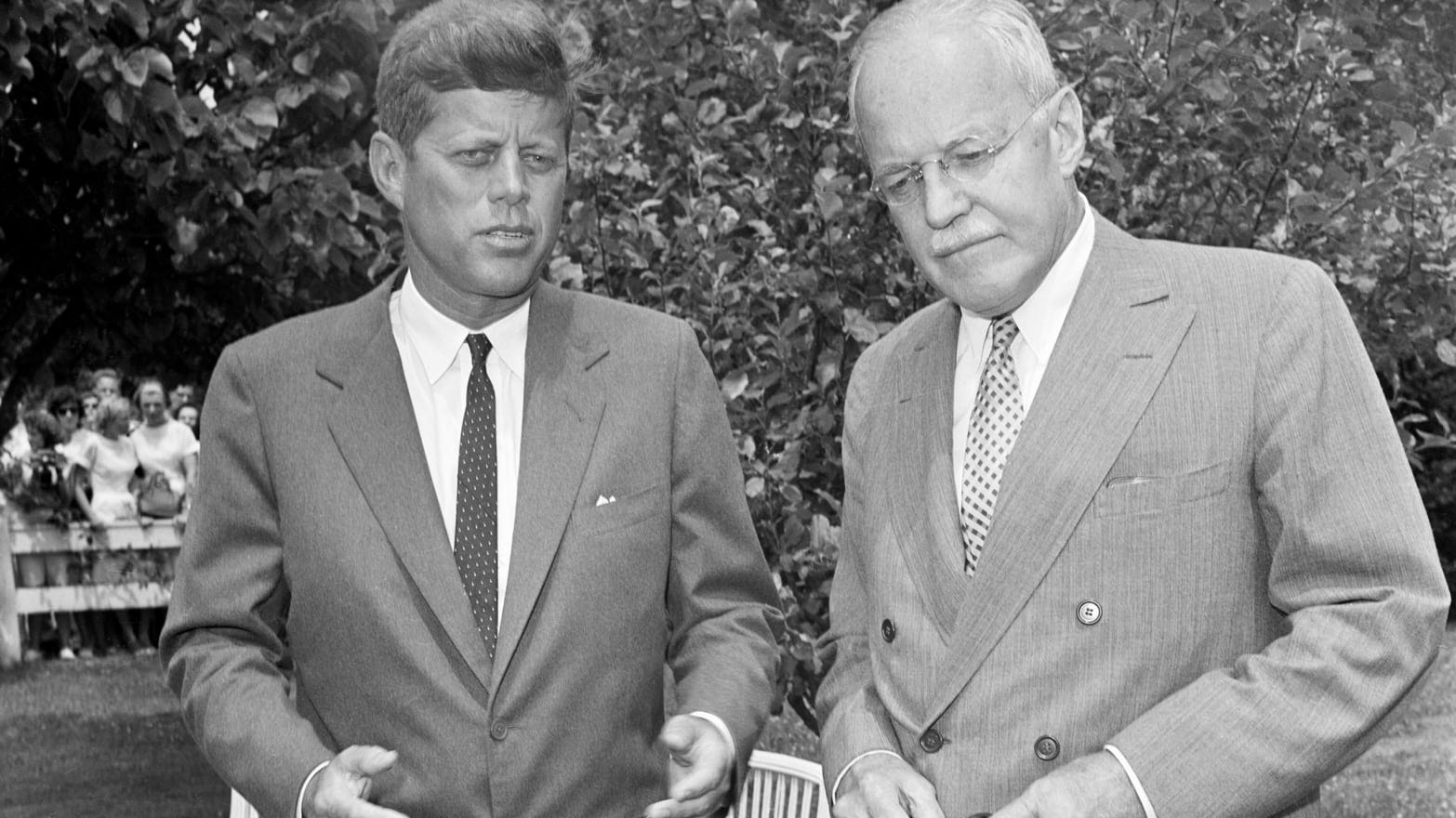
culture (noun): the way of life, especially the general customs and beliefs, of a particular group of people at a particular time
—Cambridge Dictionary
“It is inconceivable that a secret intelligence arm of the government has to comply with all the overt orders of government.”
—James Angleton, CIA Deputy Director for Operation (1954–1975) to the Church Committee
This is the second piece in our series, “Does the CIA still do that?” The first is here.
Today we start to look at what the CIA was at its start, something quite different from what it was founded to be. To understand this distinction though — what it was supposed to be versus what it is — we need to first understand the concept of “culture” as it applies to groups.
The Culture of a Society
The rules within which most social groups operate are rarely coded, rarely written down. And when they are written down, “how we do things here” is always the better description of behavior, of “the rule,” than anything put on paper.
For example, the Fourth Amendment of the United States Constitution says:
The right of the people to be secure in their persons, houses, papers, and effects, against unreasonable searches and seizures, shall not be violated, and no Warrants shall issue, but upon probable cause, supported by Oath or affirmation, and particularly describing the place to be searched, and the persons or things to be seized.
And yet that’s not “how we do things here.”
What we do now is allow the government to gather as much of our online and digital effects (property) as it can, for no reason except that these effects exist, and search them at will whenever the government chooses.
In that sense, the written Fourth Amendment has been repealed by what we permit in practice — by the culture, in other words.
The First Amendment, especially in its “establishment of religion” and “freedom of speech” restrictions, has suffered the same fate. To take the simplest example, the practice of establishing “free speech zones” — by which protesters are kept far from presidential eyes and ears — turns “freedom of speech” on its head. A practice that started with Bush II has become universal. Now, it’s just “what we do.”
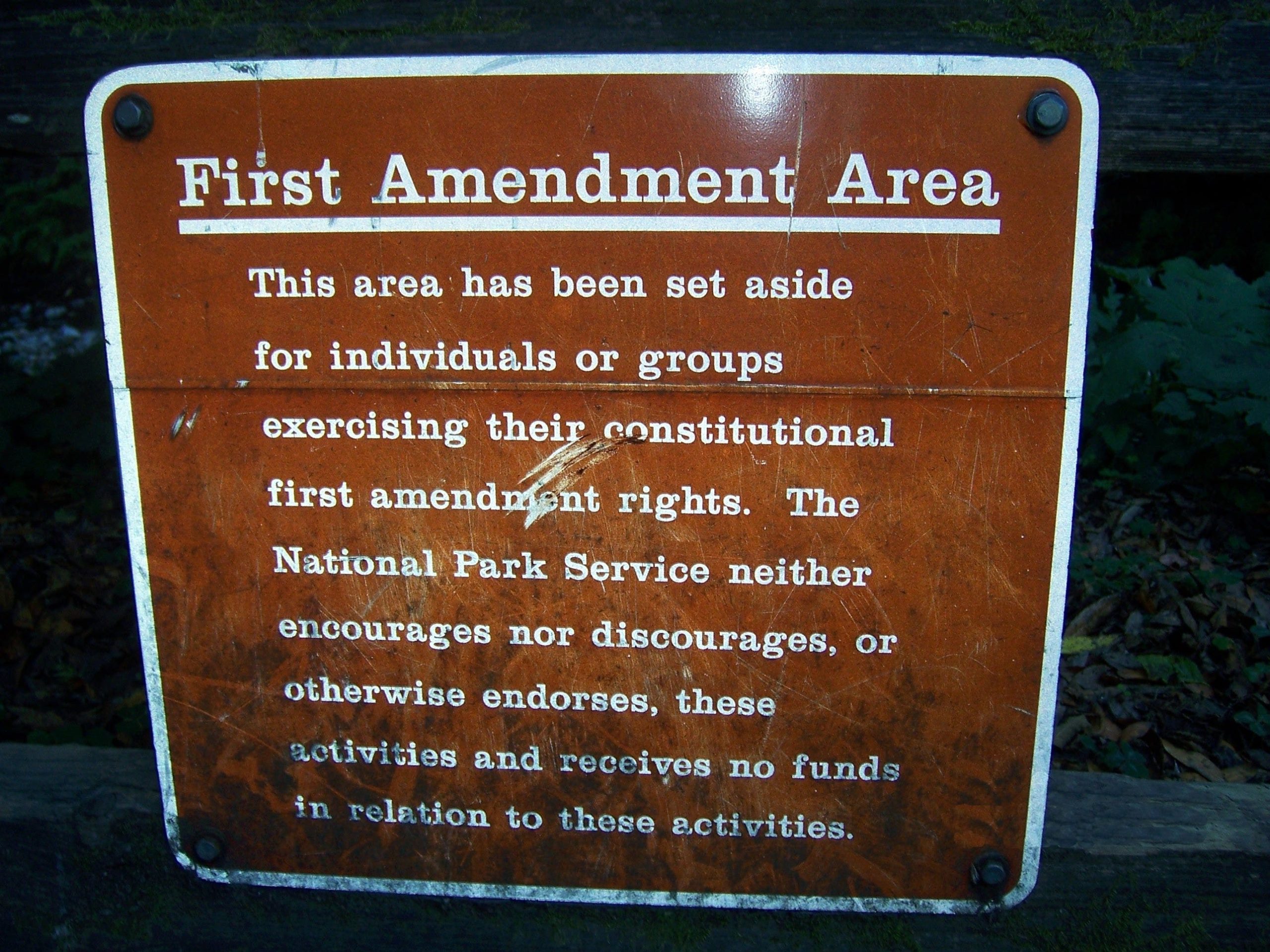
The term “culture” is often used in archaeology to designate what can be deduced about how people lived by what they left behind. The Natufian culture, for example, flourished in the Levant about 15,000 years ago. Part of what they regularly did was build dwellings and cultivate food. Cultures can spread from one group to another as this motor-mouth YouTuber explains.
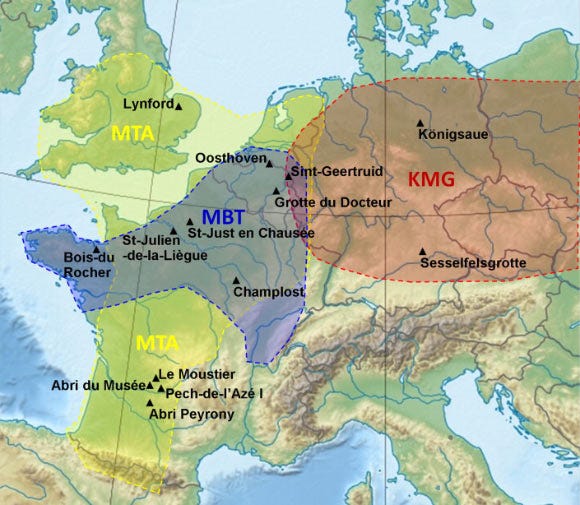
Location of the study sites and Neanderthal cultures: Mousterian of Acheulean Tradition, MTA, Keilmessergruppen, KMG, and transitional – Mousterian with Bifacial Tools, MBT (Karen Ruebens). Source: Sci News
And of course, like language, culture always evolves. Consider the difference between modern French spelling versus pronunciation. At one point the spelling, which was frozen under Louis XIV, represented the speech.
The Culture of the CIA
What does the CIA do? That’s an interesting question. Here’s what they say they do, from the CIA website:
What does the Central Intelligence Agency (CIA) do?
The Central Intelligence Agency’s primary mission is to collect, evaluate, analyze, and disseminate foreign intelligence to assist the president and senior US government policymakers in making decisions relating to the national security. CIA does not make policy; it is an independent source of foreign intelligence information for those who do. CIA may also engage in covert action at the president’s direction in accordance with applicable law.
Torture and the CIA
Note the downplaying of “covert action” in the description above. Yet this occurred throughout the Bush-Cheney years:
More Than Two-Dozen Countries Complicit In US Torture Program
Twenty-eight nations have cooperated with the U.S. to detain in their prisons, and sometimes to interrogate and torture, suspects arrested as part of the U.S. “War on Terror.”
The complicit countries have kept suspects in prisons ranging from public interior ministry buildings to “safe house” villas in downtown urban areas to obscure prisons in forests to “black” sites to which the International Committee of the Red Cross (ICRC) has been denied access.
According to published reports, an estimated 50 prisons have been used to hold detainees in these 28 countries. Additionally, at least 25 more prisons have been operated either by the U.S. or by the government of occupied-Afghanistan in behalf of the U.S., and 20 more prisons have been similarly operated in Iraq.
As the London-based legal rights group Reprieve estimates the U.S. has used 17 ships as floating prisons since 2001, the total number of prisons operated by the U.S. and/or its allies to house alleged terrorist suspects since 2001 exceeds 100. And this figure may well be far short of the actual number.
Countries that held prisoners in behalf of the U.S. based on published data are Algeria, Azerbaijan, Bosnia, Djibouti, Egypt, Ethiopia, Gambia, Israel, Jordan, Kenya, Kosovo, Libya, Lithuania, Mauritania, Morocco, Pakistan, Poland, Qatar, Romania, Saudi Arabia, Syria, Somalia, South Africa, Thailand, United Kingdom, Uzbekistan, Yemen, and Zambia. Some of the above-named countries held suspects in behalf of the Central Intelligence Agency (CIA); others held suspects in behalf the U.S. military, or both.
Scott Stantis via US News & World Report
Gina Haspel was nominated and confirmed as head of the CIA in 2018 despite her having been “chief of base at the secret CIA black site in Thailand when al-Qaeda suspects, including Abd al-Rahim al-Nashiri, were waterboarded and brutalized in 2002. Ten years later, Sondra Crosby said al-Nashiri was ‘one of the most severely traumatized individuals I have ever seen.’” [updated Crosby link here]Haspel also supported the destruction of the Bush-Cheney era CIA torture tapes:
=”youtube-inner”>
Notice her hand-waved use of magic phrases: “security risk posed to our [CIA] officers” and “conforming to US law.”
Despite her past as a master of torturers, she was confirmed.
Torture and American Culture
Americans have been torturing people for centuries. Our police regularly commit torture. Most are familiar with modern examples, but consider this report from the presidency of Herbert Hoover:
In uncompromising language, the Report on Lawlessness in Law Enforcementconcluded that [t]he third degree—that is, the use of physical brutality, or other forms of cruelty, to obtain involuntary confessions or admissions—is widespread.
Even today, people talk about giving someone “the third degree.”
Our military also tortures; the practice goes back at least to the late 1800s:
The first use of wartime water torture by Americans occurred during the Philippine-American War of 1899 to 1902, when American soldiers and their indigenous minions used the “water cure” to extract information from Filipinos who resisted the occupation of their land, and to punish them.
Image source: twitter.com/FrancescaHumi/status/1166315157565386752I can’t imagine, though, that the use of torture in America started that late. Here’s Christopher Columbus in the mid-1590s:
Columbus forced the Natives to work in gold mines until exhaustion. Those who opposed were beheaded or had their ears cut off.
In the provinces of Cicao [in Haiti], all persons over 14 had to supply at least a thimble of gold dust every three months and were given copper necklaces as proof of their compliance. Those who did not fulfill their obligation had their hands cut off, which were tied around their necks while they bled to death—some 10,000 died handless.
Where Does the Culture of the CIA Come From?
To consider the source of CIA culture, one needs to look at two men. The first is OSS officer and later CIA chief Allen Dulles. The other is James Angleton, counter-intellingence chief from 1954 to 1975. (See quote above.) More on Angleton later.
Allen Dulles Betrays FDR
Allen Dulles served in the OSS, primarily as Swiss director, “America’s top spy” in dealing with Nazis, from October 1941 to October 1945. After the war, he was recruited into the CIA in 1951 as Deputy Director of Plans (the operations division) and became the fifth Director of the CIA, serving (I hate to use that word) from 1953 to 1961, when John Kennedy forced him out.
About Dulles’ time in Switzerland, the historian (and fabulous story-teller) David Talbot wrote this:
There was nothing undercover about Allen Dulles’s wartime exploits in Switzerland. Afterward, he made much of his espionage adventures, with a sympathetic press and then equally credulous biographers dutifully repeating his beguiling tales. But, in truth, there was little daring involved—for a very simple reason. Dulles was more in step with many Nazi leaders than he was with President Roosevelt. Dulles not only enjoyed a professional and social familiarity with many members of the Third Reich’s elite that predated the war; he shared many of these men’s postwar goals. While serving in his Swiss outpost, Dulles might have been encircled by Nazi forces, but he was also surrounded by old friends.
The rest of the wartime part of his story details, among other things, his betrayal of Roosevelt’s direct orders.
The Casablanca Conference was a major turning point in the war, sealing the fate of Hitler and his inner circle. As Roosevelt told the American people in a radio address following the conference, by taking an uncompromising stand against the Third Reich, the Allies made clear that they would not allow Hitler’s regime to divide the antifascist alliance or to escape justice for its monumental crimes. “In our uncompromising policy,” said Roosevelt, “we mean no harm to the common people of the Axis nations. But we do mean to impose punishment and retribution in full upon their guilty, barbaric leaders.”
With his close ties to Germany’s upper echelons, Dulles considered the unconditional surrender declaration a “disaster” and was quick to let his Nazi contacts know what he thought about it. Shortly after the Casablanca Conference, Dulles sat down one wintry evening with an agent of SS leader Heinrich Himmler, an oily Mittel-European aristocrat who had flitted in and out of Dulles’s social circle for many years. Dulles received his guest, who was known as “the Nazi prince,” at 23 Herrengasse [Dulles’ Bern headquarters], treating him to good Scotch in a drawing room warmed by a fire. The Casablanca Declaration had clearly unnerved Himmler’s circle by making it clear that there would be no escape for the Reich’s “barbaric leaders.” But Dulles took pains to put his guest’s mind at rest. The Allies’ declaration, Dulles assured him, was “merely a piece of paper to be scrapped without further ado if Germany would sue for peace.”
Thus began Allen Dulles’s reign of treason as America’s top spy in Nazi-occupied Europe.
And:
Instead of Roosevelt’s “unconditional surrender,” in which the Nazi leadership would be held accountable for their crimes against humanity, Dulles was proposing a kind of no-fault surrender. It was a stunningly cynical and insubordinate gambit. The pact that Dulles envisioned not only dismissed the genocide against the Jews as an irrelevant issue, it also rejected the president’s firmly stated policy against secret deal making with the enemy. The man in the White House, clinging to his anti-Nazi principles, was clearly one of those “outdated politicians” in Dulles’s mind. While boldly undermining his president, Dulles had the nerve to assure Hohenlohe [the ‘Nazi prince’] that he had FDR’s “complete support.”
The fireplace meeting was, in fact, a double betrayal—Dulles’s of President Roosevelt, and the Nazi prince’s of Adolf Hitler.
This is the well from which CIA culture springs.
Dulles betrayed the orders of his supposed commanders many times since then. More in future installments.
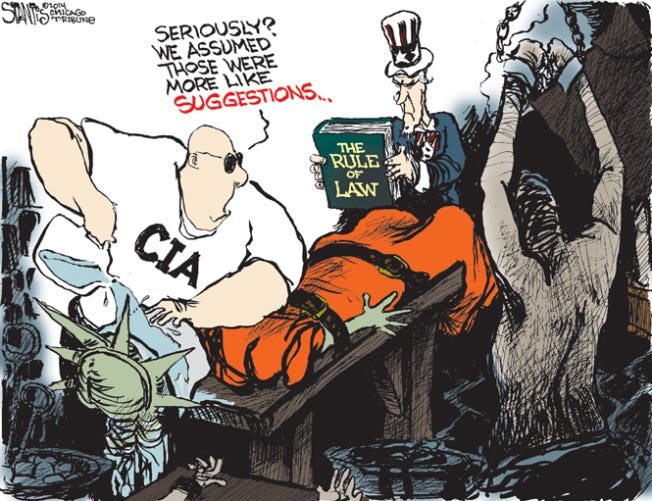
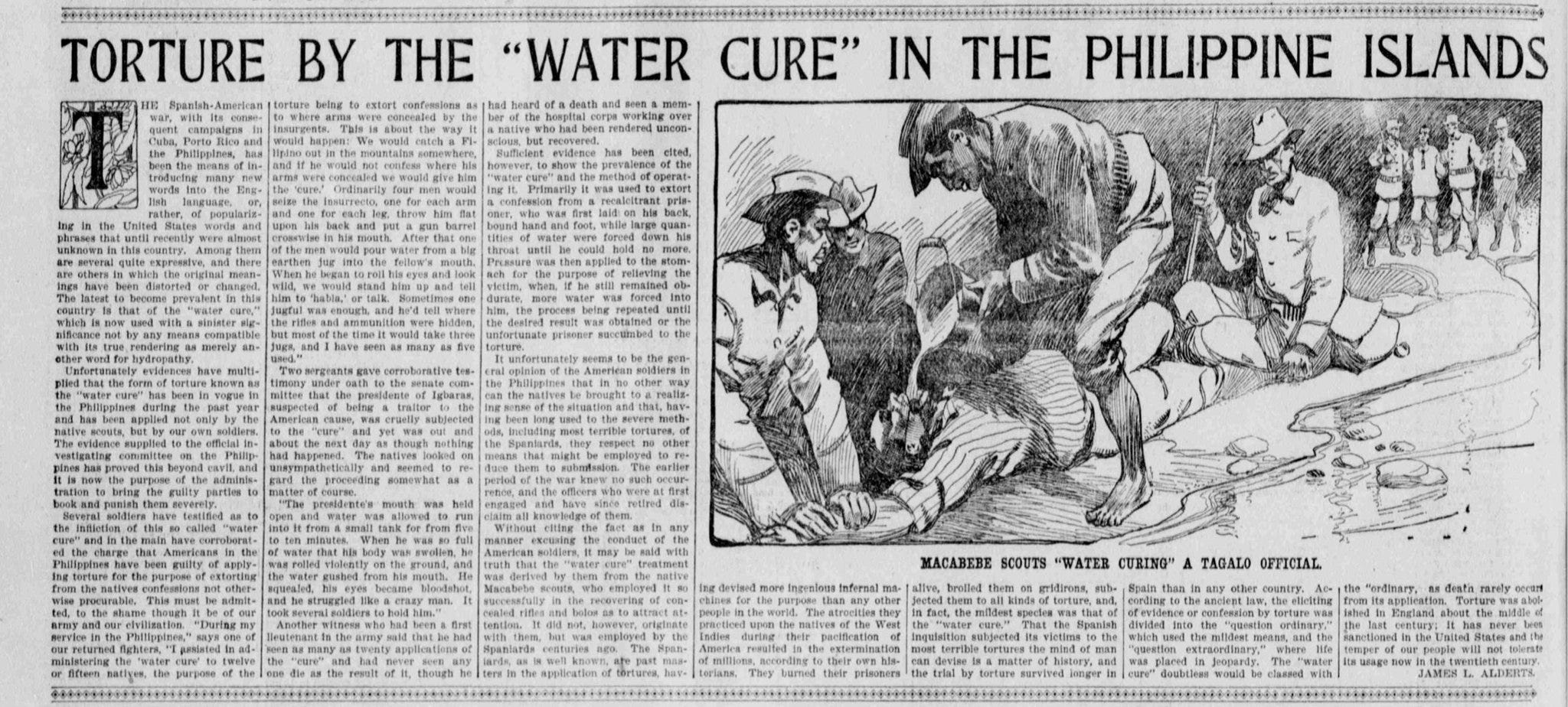
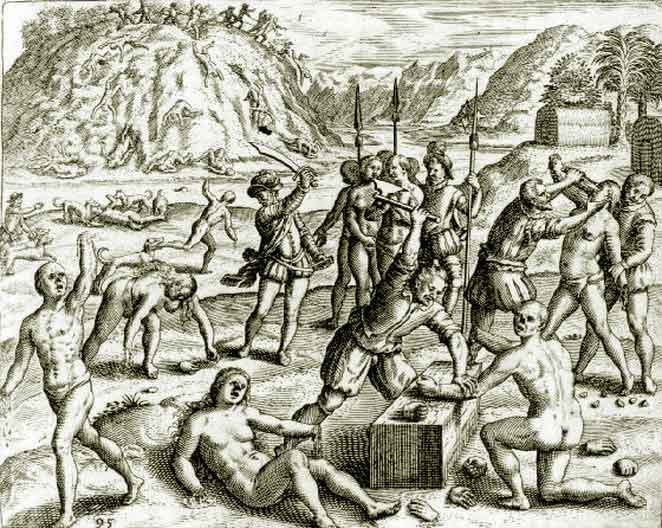
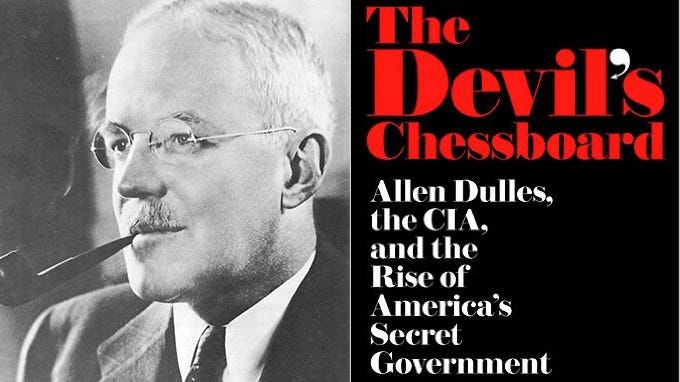


Those who own the USA can use all of the organs of the state but particularly those that are governed by rules of secrecy and are hierarchical.
The people at the top are responsive.
The USA is not alone in this. Gold is the true source of control but blackmail is the result and corrupts the rest of the state, unless there is vigilance.
To remedy this, simply use the information of those who served the owners to ensare the owners. Anti corruption agencies can be established in secret at first. I note a lot of mid level ex CIA candidates were successful in the last set of elections … They are the ones who resent the corruption most.
“I note a lot of mid level ex CIA candidates were successful in the last set of elections … They are the ones who resent the corruption most.”
Or, they’re just doing their part to further the regulatory capture and further protect and enhance the corruption.
Columbus in the mid-1590s was a victim of a typo, should be “mid 1490s”
Thanks, Piotr. Corrected at the source.
Thomas.
A good book recommendation on those who are interested in this topic is Douglas Valentine’s The CIA as Organized Crime: How Illegal Operations Corrupt America and the World
https://www.amazon.com/CIA-Organized-Crime-Illegal-Operations/dp/0997287012
I strongly second this recommendation. Valentine is probably the best informed and least compromised of any “outsider” author about the CIA. He explains how he was able to gain such extraordinary access to inside sources via William Colby at the beginning of that book. This book, based on interviews and articles, provides a nice overview of Valentine’s work over the years.
Valentine’s–The Phoenix Program: America’s Use of Terror in Vietnam, is also a must read to understand what the CIA does. The intelligence fusion centers that were established in South Vietnam as part of Phoenix are the forebears of the Homeland Security Intelligence fusion centers we see today.
What’s fascinating is that Valentine’s first book–Hotel Tacloban–was read by the CIA’s William Colby, who liked it so much that he gave Valentine access to all of the Phoenix participants
Looks like a good read, thx for the recommendation! And it’s also available here for those averse to sending $$$ to the Emerald City Cue Ball.
Good suggestion, I have a copy on my bookshelf, as well as The Devil’s Chessboard. (as well as The Grand Chessboard by Zbig B.)
If this is a “first look” then hopefully future looks will depend on more than David Talbot, the onetime founder of Salon (and “independent historian”) who thought Bill Clinton was a great guy and the new Kennedy. Far too many are taking Talbot’s speculations as fact.
Of course when Allen Dulles was in his heyday he was hardly alone and had the support of Cold Warrior presidents from Truman to Eisenhower, many in Congress and Hoover at the FBI. The betrayal of FDR may have come from Truman who created the CIA (as indeed an intelligence source for the president) from an OSS that had a mixed record and continued to so have through the Fifties and the famous Bay of Pigs that got Dulles fired. The notion that this gang of bumblers could kill the president and then get away with it for decades at least merits a degree of skepticism. IMO.
Second this. I have also seen David Talbot everywhere, not just here, would be curious to see other sources.
To which “speculations” are you referring? Talbot is quite critical of Dulles, of course, so he has a slant or bias as do most authors. But most of his information on Dulles’ life is pretty well-documented. Compare it to Stephen Kinzer’s book ‘The Brothers,’ for example, which covers a lot of the same issues including his undermining of Roosevelt in making deals with Nazi collaborators as the war wound down.
Talbot’s main notorious “speculation” is about Dulles’ relation to the Kennedy assassination. I’m guessing by your comment that this is a big one for you. But on that topic he is clear that he *is* speculating; he does not claim to know as a “fact” what this relationship is (though you are probably right that some of his readers would do so). What he does do is discuss Dulles’ curious actions the weekend of the assassination. These are documented (i.e. “facts”), though in my view they could be explained without the assassination link.
It’s true that Truman created the CIA, and his simplistic knee-jerk anti-Communism led him to sign off on a number of morally ambiguous projects (not as many as Eisenhower though). But I think it is clear that Truman was in over his head (as Roosevelt might not have been, but who knows for sure?) and he famously regretted (when it was too late) the monster he had created. It was Eisenhower who unleashed the Dulles bros on the world, though I think he, too, had some regrets – again, after the fact.
Among those supporters about the assassination theory include RFK jr. and seemingly the above article. Of course Talbot can’t claim his CIA killed Kennedy theory as fact because he doesn’t have the proof. What I’m opining is that even the speculation is off the wall.
As for how he “betrayed” FDR, how was that exactly? Of course the Nazis weren’t so stupid to believe that the Allies were going to let them off the hook and FDR could hardly have retracted his clear statement that he wasn’t going to do so. That some of them were let off can hardly be chalked up to Dulles alone as the US military was eager to make use of the rocket scientists and others. What I’m saying is that Talbot is over egging the pudding in this as so much else.
The problem with the theory that the CIA killed JFK is that it hasn’t been subject to enough skepticism over the decades? David Talbot’s book provides alll sorts of convincing (to me) detail, and fits well with many other throrough books on the subject. If you’ve got a problem with Talbot’s research, let’s hear it, but what you provide hear is thin gruel for believing the official story that Oswald was a long gumen who, dispite his US military-intelligence past and sketchy time in the USSR, was repatriated to US without issue and was of course in no way a patsy. Patriotic gangster Lloyd Ruby did the right thing in getting rid of him before trial, and fired CIA chief Dulles was the perfect person to get to the bottom of assassianation and reveal the truth!
Believe on. Chomsky, Alex Cockburn and others scoffed at all the CT but I’ll just say enough with the Talbot. I am quite familiar with his long ago reign at Salon which in its political coverage did not impress.
Neither Chomsky nor Cockburn ever seriously considered this issue to my knowledge. They just “scoffed” at those who did. Why should anyone consider either of them an authority on this subject? As Dan suggests above, if you have a problem with the evidence then you should discuss the problems with that evidence. But Chomsky and Cockburn have never done this. Rather, these two “radical” voices seem to support the official story. Then they make statements like “there isn’t a shred of evidence that…” etc. Which reflects either total ignorance or a lie. That doesn’t much recommend them to me, since in my own opinion anyone who spends half an hour honestly looking at the evidence would “scoff” at that tale.
Sorry but my only objection here is the use of Talbot’s theories in an article that is supposed to be giving us new and interesting info about the CIA. I believe what Chomsky really said is that it doesn’t matter who killed Kennedy. In fact if the CIA did kill Kennedy that might be the least of their crimes unless you buy the Oliver Stone thesis that the world would have been different had Kennedy lived (and been re-elected….not at alll certain). In other words Talbot’s CT and Kennedy hagiography go hand in hand. That said it’s hardly surprising that RFK jr. believes the whole thing.
JFK may have once said that the CIA should be broken into a thousand pieces but that doesn’t mean he was going to do it or had the power to do it. In fact he seen to be struggling with what he did do and one reason he went to dangerous Dallas was to prop up his shaky electoral prospects. There’s a bucket load of context that is being left out of the fable promoted by his widow after his death and kept alive by Talbot and others
That was Jack Ruby.
Allen Dulles attended more sessions of the Warren Commission than any other member, including Earl Warren (who didn’t want the job) and future president Ford. He directed the investigation and steered it towards the claim that Oswald acted alone.
It’s been a while since I’ve read “JFK and the Unspeakable”, by James Douglas, but its wealth of detail seems to jibe well with Talbot’s book, which I’ve also read. I think both provide strong, albeit circumstantial, evidence that the CIA was involved in JFK’s death, either directly or through its other rogue arm, the Mob. I’m reminded that Ray McGovern is often shown in interviews with the Douglas book behind him. It’s well worth the read.
Gabriel Rockhill, “The Intellectual World War: Class Struggle in Theory” also has some things to say about CIA activities:
https://www.youtube.com/watch?v=Q521mBZ7ThU
The Constitution has long been a dead letter. Just say the magic words “Muh National Security abracadabra!” and poof! The Bill Of Rights disappears.
This is because law is meaningless. Enforcement is the only thing that matters, and the CIA has put itself beyond any enforcement.
With that in mind, the culture of the CIA has nothing to do with Columbus or Indoeuropean tribes. Rather, it is what inevitably happens when you give any group of humans power with no accountability. Rights but no responsibilities. Law but only enforced when and as the group desires.
“It works the same in any country.” -H. Goering.
National security, the only words that can trump think of the children…
Ah yes, Switzerland during WW2.
Another character there was a Prescott Bush, father of CIA chief and president GHW Bush, and grandfather of president GW Bush.
One thing to keep in mind is that Nazism grew out of Eugenics, something that was practiced all over Europe and North America. And in some parts of USA kept going into the 70s!
Quite a few back then also saw Fascism as a lesser evil and counter to Communism.
US companies, through “neutral” Franco Spain, kept trading with Nazi Germany after FDR imposed sanctions.
Some even sued, and won, against the US government after WW2 for damage done to “their” factories in Germany.
That FDR was able to get re-elected in the middle of it all, twice, is a miracle.
Thanks for posting this series Yves. Many may be busy with careers and their lives and do not read books that bring them no immediate benefit. This will give them a digest of information about the intelligence community and the excellent commentary will provide those with time to find more sources of information. I look forward to more in the future.
I find it useful when thinking about the role of the CIA in governance to try to put aside all ideological biases and ask yourself what type of institutional networks and skill sets would be needed to create a long- running hegemonic world power.
Certainly, if you initially want to create geo-strategic hegemony in North and South America you better make sure that you have an institution/network that has access/inroads into every organic political, ethnic, cultural, or criminal entity within, lets say all of Central America. If you have such linkages established than you are in a perfect position to move a particular society/culture in the direction you feel is necessary to maintain hegemony.
I would also speculate that you need some kind of over-all foreign policy planning center where key brainiacs (think George Kennan and the policy of containment after WWII) decide how to define, for public consumption, our national interest and our national security interests–my candidate would be the policy planning staff of our U.S. State Dept. They seem to be structurally in a perfect position to create, direct, implement and coordinate all necessary policy initiatives that nicely merge together the necessaryt over-world initiatives of public diplomacy and commercial relations along with the necessary underworld initiatives of criminals, gun-running, drugs, and regime change.
I would also take a careful look at the historic role our Dept. of Justice and the counter-insurgency arm of the FBI, both of which seem historically quite focused on protecting our, at the moment, “good” criminals from any type of legal vulnerability.
In both foreign policy and financial policy we seem to a face tightly inter-woven public and private networks as well as the individuals who move back and forth between them.
I started making a collection of bookmarks at the beginning of the SMO. Worried things would disappear down the memory hole. This article ties in to the discussion here.
https://asawinstanley.substack.com/p/how-the-cia-oversaw-belgiums-secret?s=r
How the CIA oversaw Belgium’s secret Nazi army
“We knew we were protected” — NATO’s terrorist army recruited fascists and targeted ordinary civilians to strike fear into the heart of the populace and abort radical political change.
Check for Fletcher Prouty „The Secret Team“. An incredibly rich source on CIA history and the inner workings of the Agency.